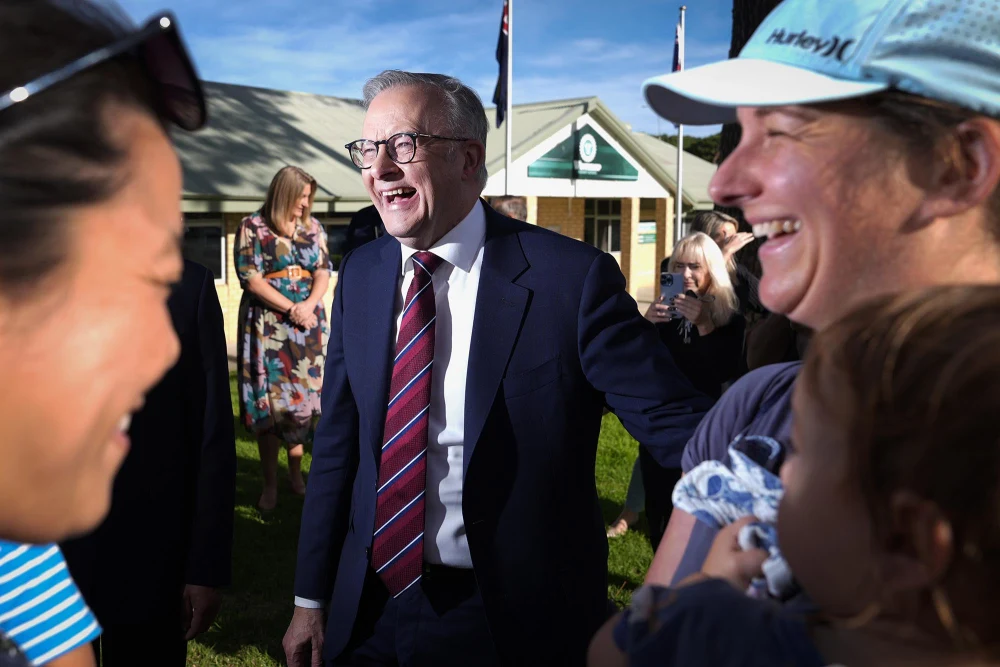Days after a Canadian election focused on which leader would best stand up to U.S. President Donald Trump, he has once again found himself at the center of an election in another liberal democracy.
Trust in the U.S. is plummeting in Australia, which goes to the polls on Saturday, amid global financial chaos triggered by Trump’s tariffs on trading partners, including Australia, a key U.S. ally in countering China.
Similar to Canada, Australia’s conservative opposition party, the Liberal Party, was poised for victory before Trump’s return to office, bolstered by public anger over rising living costs and soaring home prices. However, support has since eroded as voters become increasingly wary of how their government will navigate Trump’s influence.
On Thursday, two polls showed the Liberals trailing the center-left Labor Party, led by Prime Minister Anthony Albanese.
His rival, Peter Dutton, has pushed the Liberals further right since taking over as party leader in 2022.
Dutton’s alignment with Trump is evident in his promises to cut 41,000 public sector jobs, limit legal migration to Australia, and appoint a shadow minister for government efficiency, earning him the nickname “DOGE-y Dutton” from his critics. Despite Dutton’s insistence that he is his “own person,” his connection to Trump has become a liability with Australian voters, according to John Blaxland, a professor of international security and intelligence studies at the Australian National University.
“Dutton, perhaps overenthusiastically, endorsed President Trump’s victory without realizing how difficult that would make his position — not with the far-right, but with the swing voters in the center, where elections are won in Australia,” Blaxland said. A poll from the Lowy Institute last month revealed that only 36% of Australians trust the U.S., the lowest level recorded in the survey’s two-decade history.
Blaxland described Trump’s disregard for longstanding alliances and his transactional approach to U.S. foreign policy as “vertigo-inducing” for Australian politicians, policymakers, and voters, where voting is mandatory.
The Trump administration’s “hyperrealist, short-term, transactional approach to its relationships is deeply unsettling and corrosive of goodwill,” he said.

Trump has treated Australia as just another economic partner, imposing a 10% tariff on all exports to the U.S., despite the U.S. running a trade surplus with Australia. (In a rare exception, Australia reported Thursday that it sold more to the U.S. than it bought in the first quarter, as investors rushed to buy gold, a top export.) While 81% of Australians disapprove of Trump’s tariffs, a strong majority (80%) still see the U.S. alliance as crucial for Australia’s security.
These figures underscore the economic and security dilemma facing Australia: how to balance its security ties with the U.S. against its economic interests with China.
Albanese has worked throughout his tenure to repair relations with China, which soured under the previous conservative government, resulting in harsh trade restrictions imposed by Beijing.
China is Australia’s largest two-way trading partner, accounting for 25% of the nation’s goods and services trade in 2023-24. The U.S. ranks third in this regard and is the largest source of foreign investment.
“If the U.S., with its 145% tariffs on Chinese imports, severely damages the Chinese economy, it will have a major impact on Australia,” said Stuart Rollo, a postdoctoral fellow at the Centre for International Security Studies at the University of Sydney.
Rollo expressed concern that Australia could be caught in the crossfire if the U.S. pressures its allies to cut ties with China economically.
“So much of our future prosperity depends on Chinese growth,” he said. “For us to choose to disconnect from that, simply to maintain U.S. protection, would come at a real cost to the living standards of Australians.”
Without the U.S., however, Australia would be cut off from critical military technology and would be far less secure against Chinese aggression.
Australia’s vulnerabilities were made clear in February when China conducted live-fire military drills off the Australian coast, rerouting dozens of commercial flights. As a result, politicians from both sides of the aisle maintain their commitment to AUKUS, the security pact between Australia, the U.S., and the U.K., even as Australians question the reliability of the U.S. as a defense partner.
“We’re this Anglo-European community sitting at the edge of Asia, and that drives our fear of abandonment, pushing us toward the United States,” Blaxland explained.
Under AUKUS, Australia is set to purchase nuclear-powered submarines from the U.S. as a countermeasure against China.
However, Australia’s ability to fund these submarines is dependent on its trade with China, said James Laurenceson, director of the Australia-China Relations Institute at the University of Technology Sydney.
“This is a big cost issue for a small economy like Australia,” he said. “We just can’t go all in on AUKUS, on the U.S., and on containing China and expect that our trade with China, which funds our submarines, will hold up. It can’t.”
Both Albanese and Dutton have played down any concerns regarding U.S. relations, but Laurenceson believes cracks are beginning to show in the bipartisan support for the alliance.
“We’ll say that our security alliance with the U.S. is much more than just about one administration,” he said. “Yes, that’s true, but Trump is certainly testing that.”

